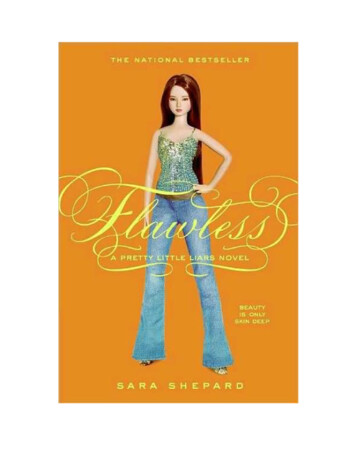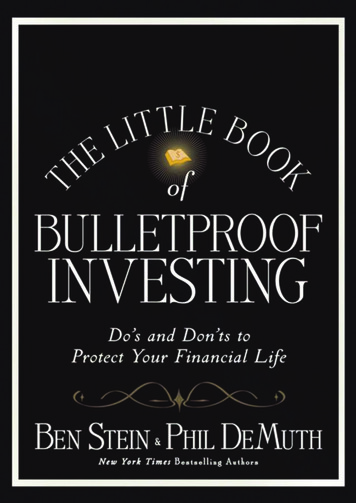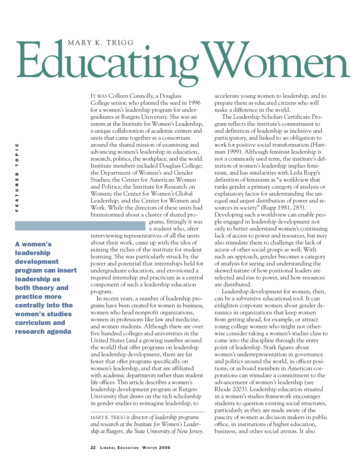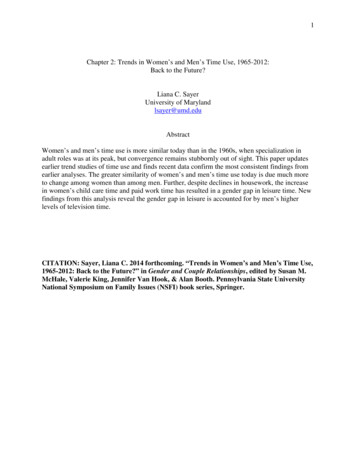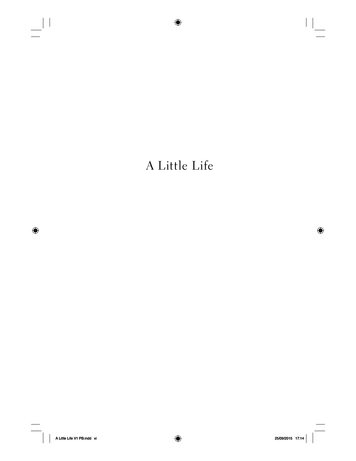
Transcription
A Little LifeA Little Life V1 PB.indd xi25/09/2015 17:14
A Little Life V1 PB.indd xii25/09/2015 17:14
[I]Lispenard StreetYana 9780385539258 2p all r1.indd 111/25/14 7:39 AM
Yana 9780385539258 2p all r1.indd 211/25/14 7:39 AM
1Th e e l e v e n t h a pa r t m e n t had only one closet, but it did havea sliding glass door that opened onto a small balcony, from which hecould see a man sitting across the way, outdoors in only a T- shirt andshorts even though it was October, smoking. Willem held up a hand ingreeting to him, but the man didn’t wave back.In the bedroom, Jude was accordioning the closet door, openingand shutting it, when Willem came in. “There’s only one closet,” hesaid.“That’s okay,” Willem said. “I have nothing to put in it anyway.”“Neither do I.” They smiled at each other. The agent from thebuilding wandered in after them. “We’ll take it,” Jude told her.But back at the agent’s office, they were told they couldn’t rent theapartment after all. “Why not?” Jude asked her.“You don’t make enough to cover six months’ rent, and you don’thave anything in savings,” said the agent, suddenly terse. She hadchecked their credit and their bank accounts and had at last realizedthat there was something amiss about two men in their twenties whowere not a couple and yet were trying to rent a one- bedroom apartmenton a dull (but still expensive) stretch of Twenty- fifth Street. “Do youhave anyone who can sign on as your guarantor? A boss? Parents?”“Our parents are dead,” said Willem, swiftly.The agent sighed. “Then I suggest you lower your expectations.No one who manages a well- run building is going to rent to candidatesYana 9780385539258 2p all r1.indd 311/25/14 7:39 AM
4 a little lifewith your financial profile.” And then she stood, with an air of finality,and looked pointedly at the door.When they told JB and Malcolm this, however, they made it into acomedy: the apartment floor became tattooed with mouse droppings,the man across the way had almost exposed himself, the agent was upsetbecause she had been flirting with Willem and he hadn’t reciprocated.“Who wants to live on Twenty- fifth and Second anyway,” asked JB.They were at Pho Viet Huong in Chinatown, where they met twice amonth for dinner. Pho Viet Huong wasn’t very good— the pho was curiously sugary, the lime juice was soapy, and at least one of them got sickafter every meal— but they kept coming, both out of habit and necessity.You could get a bowl of soup or a sandwich at Pho Viet Huong for fivedollars, or you could get an entrée, which were eight to ten dollars butmuch larger, so you could save half of it for the next day or for a snacklater that night. Only Malcolm never ate the whole of his entrée andnever saved the other half either, and when he was finished eating, heput his plate in the center of the table so Willem and JB— who werealways hungry— could eat the rest.“Of course we don’t want to live at Twenty- fifth and Second, JB,”said Willem, patiently, “but we don’t really have a choice. We don’thave any money, remember?”“I don’t understand why you don’t stay where you are,” said Malcolm, who was now pushing his mushrooms and tofu— he alwaysordered the same dish: oyster mushrooms and braised tofu in a treaclybrown sauce— around his plate, as Willem and JB eyed it.“Well, I can’t,” Willem said. “Remember?” He had to haveexplained this to Malcolm a dozen times in the last three months.“Merritt’s boyfriend’s moving in, so I have to move out.”“But why do you have to move out?”“Because it’s Merritt’s name on the lease, Malcolm!” said JB.“Oh,” Malcolm said. He was quiet. He often forgot what he considered inconsequential details, but he also never seemed to mind whenpeople grew impatient with him for forgetting. “Right.” He moved themushrooms to the center of the table. “But you, Jude— ”“I can’t stay at your place forever, Malcolm. Your parents are goingto kill me at some point.”“My parents love you.”Yana 9780385539258 2p all r1.indd 411/25/14 7:39 AM
l i s p e n a r d s t r e e t 5“That’s nice of you to say. But they won’t if I don’t move out, andsoon.”Malcolm was the only one of the four of them who lived at home,and as JB liked to say, if he had Malcolm’s home, he would live at hometoo. It wasn’t as if Malcolm’s house was particularly grand— it was, infact, creaky and ill- kept, and Willem had once gotten a splinter simplyby running his hand up its banister— but it was large: a real Upper EastSide town house. Malcolm’s sister, Flora, who was three years olderthan him, had moved out of the basement apartment recently, and Judehad taken her place as a short- term solution: Eventually, Malcolm’s parents would want to reclaim the unit to convert it into offices for hismother’s literary agency, which meant Jude (who was finding the flightof stairs that led down to it too difficult to navigate anyway) had to lookfor his own apartment.And it was natural that he would live with Willem; they had beenroommates throughout college. In their first year, the four of them hadshared a space that consisted of a cinder- blocked common room, wheresat their desks and chairs and a couch that JB’s aunts had driven up in aU- Haul, and a second, far tinier room, in which two sets of bunk bedshad been placed. This room had been so narrow that Malcolm andJude, lying in the bottom bunks, could reach out and grab each other’shands. Malcolm and JB had shared one of the units; Jude and Willemhad shared the other.“It’s blacks versus whites,” JB would say.“Jude’s not white,” Willem would respond.“And I’m not black,” Malcolm would add, more to annoy JB thanbecause he believed it.“Well,” JB said now, pulling the plate of mushrooms toward himwith the tines of his fork, “I’d say you could both stay with me, but I thinkyou’d fucking hate it.” JB lived in a massive, filthy loft in Little Italy, fullof strange hallways that led to unused, oddly shaped cul- de- sacs andunfinished half rooms, the Sheetrock abandoned mid- construction,which belonged to another person they knew from college. Ezra wasan artist, a bad one, but he didn’t need to be good because, as JB likedto remind them, he would never have to work in his entire life. And notonly would he never have to work, but his children’s children’s childrenwould never have to work: They could make bad, unsalable, worthlessYana 9780385539258 2p all r1.indd 511/25/14 7:39 AM
6 a little lifeart for generations and they would still be able to buy at whim the bestoils they wanted, and impractically large lofts in downtown Manhattanthat they could trash with their bad architectural decisions, and whenthey got sick of the artist’s life— as JB was convinced Ezra somedaywould— all they would need to do is call their trust officers and beawarded an enormous lump sum of cash of an amount that the four ofthem (well, maybe not Malcolm) could never dream of seeing in theirlifetimes. In the meantime, though, Ezra was a useful person to know,not only because he let JB and a few of his other friends from school stayin his apartment— at any time, there were four or five people burrowingin various corners of the loft— but because he was a good- natured andbasically generous person, and liked to throw excessive parties in whichcopious amounts of food and drugs and alcohol were available for free.“Hold up,” JB said, putting his chopsticks down. “I just realized— there’s someone at the magazine renting some place for her aunt. Like,just on the verge of Chinatown.”“How much is it?” asked Willem.“Probably nothing— she didn’t even know what to ask for it. Andshe wants someone in there that she knows.”“Do you think you could put in a good word?”“Better— I’ll introduce you. Can you come by the office tomorrow?”Jude sighed. “I won’t be able to get away.” He looked at Willem.“Don’t worry— I can. What time?”“Lunchtime, I guess. One?”“I’ll be there.”Willem was still hungry, but he let JB eat the rest of the mushrooms.Then they all waited around for a bit; sometimes Malcolm orderedjackfruit ice cream, the one consistently good thing on the menu, atetwo bites, and then stopped, and he and JB would finish the rest. Butthis time he didn’t order the ice cream, and so they asked for the bill sothey could study it and divide it to the dollar.―The next day, Willem met JB at his office. JB worked as a receptionist at a small but influential magazine based in SoHo that covered thedowntown art scene. This was a strategic job for him; his plan, as he’dexplained to Willem one night, was that he’d try to befriend one of theYana 9780385539258 2p all r1.indd 611/25/14 7:39 AM
l i s p e n a r d s t r e e t 7editors there and then convince him to feature him in the magazine.He estimated this taking about six months, which meant he had threemore to go.JB wore a perpetual expression of mild disbelief while at his job,both that he should be working at all and that no one had yet thought torecognize his special genius. He was not a good receptionist. Althoughthe phones rang more or less constantly, he rarely picked them up;when any of them wanted to get through to him (the cell phone reception in the building was inconsistent), they had to follow a special codeof ringing twice, hanging up, and then ringing again. And even thenhe sometimes failed to answer— his hands were busy beneath his desk,combing and plaiting snarls of hair from a black plastic trash bag hekept at his feet.JB was going through, as he put it, his hair phase. Recently he haddecided to take a break from painting in favor of making sculpturesfrom black hair. Each of them had spent an exhausting weekend following JB from barbershop to beauty shop in Queens, Brooklyn, the Bronx,and Manhattan, waiting outside as JB went in to ask the owners for anysweepings or cuttings they might have, and then lugging an increasingly awkward bag of hair down the street after him. His early pieceshad included The Mace, a tennis ball that he had de- fuzzed, sliced inhalf, and filled with sand before coating it in glue and rolling it aroundand around in a carpet of hair so that the bristles moved like seaweedunderwater, and “The Kwotidien,” in which he covered various household items— a stapler; a spatula; a teacup— in pelts of hair. Now hewas working on a large- scale project that he refused to discuss withthem except in snatches, but it involved the combing out and braidingtogether of many pieces in order to make one apparently endless ropeof frizzing black hair. The previous Friday he had lured them over withthe promise of pizza and beer to help him braid, but after many hoursof tedious work, it became clear that there was no pizza and beer forthcoming, and they had left, a little irritated but not terribly surprised.They were all bored with the hair project, although Jude— aloneamong them— thought that the pieces were lovely and would somedaybe considered significant. In thanks, JB had given Jude a hair- coveredhairbrush, but then had reclaimed the gift when it looked like Ezra’sfather’s friend might be interested in buying it (he didn’t, but JB neverreturned the hairbrush to Jude). The hair project had proved difficult inYana 9780385539258 2p all r1.indd 711/25/14 7:39 AM
8 a little lifeother ways as well; another evening, when the three of them had somehow been once again conned into going to Little Italy and combingout more hair, Malcolm had commented that the hair stank. Which itdid: not of anything distasteful but simply the tangy metallic scent ofunwashed scalp. But JB had thrown one of his mounting tantrums,and had called Malcolm a self- hating Negro and an Uncle Tom anda traitor to the race, and Malcolm, who very rarely angered but whoangered over accusations like this, had dumped his wine into the nearest bag of hair and gotten up and stamped out. Jude had hurried, thebest he could, after Malcolm, and Willem had stayed to handle JB. Andalthough the two of them reconciled the next day, in the end Willemand Jude felt (unfairly, they knew) slightly angrier at Malcolm, since thenext weekend they were back in Queens, walking from barbershop tobarbershop, trying to replace the bag of hair that he had ruined.“How’s life on the black planet?” Willem asked JB now.“Black,” said JB, stuffing the plait he was untangling back into thebag. “Let’s go; I told Annika we’d be there at one thirty.” The phone onhis desk began to ring.“Don’t you want to get that?”“They’ll call back.”As they walked downtown, JB complained. So far, he had concentrated most of his seductive energies on a senior editor named Dean,whom they all called DeeAnn. They had been at a party, the threeof them, held at one of the junior editor’s parents’ apartment in theDakota, in which art- hung room bled into art- hung room. As JB talkedwith his coworkers in the kitchen, Malcolm and Willem had walkedthrough the apartment together (Where had Jude been that night?Working, probably), looking at a series of Edward Burtynskys hangingin the guest bedroom, a suite of water towers by the Bechers mountedin four rows of five over the desk in the den, an enormous Gursky floating above the half bookcases in the library, and, in the master bedroom,an entire wall of Diane Arbuses, covering the space so thoroughly thatonly a few centimeters of blank wall remained at the top and bottom.They had been admiring a picture of two sweet- faced girls with Downsyndrome playing for the camera in their too- tight, too- childish bathing suits, when Dean had approached them. He was a tall man, but hehad a small, gophery, pockmarked face that made him appear feral anduntrustworthy.Yana 9780385539258 2p all r1.indd 811/25/14 7:39 AM
l i s p e n a r d s t r e e t 9They introduced themselves, explained that they were here becausethey were JB’s friends. Dean told them that he was one of the senior editors at the magazine, and that he handled all the arts coverage.“Ah,” Willem said, careful not to look at Malcolm, whom he didnot trust not to react. JB had told them that he had targeted the arts editor as his potential mark; this must be him.“Have you ever seen anything like this?” Dean asked them, wavinga hand at the Arbuses.“Never,” Willem said. “I love Diane Arbus.”Dean stiffened, and his little features seemed to gather themselvesinto a knot in the center of his little face. “It’s DeeAnn.”“What?”“DeeAnn. You pronounce her name ‘DeeAnn.’ ”They had barely been able to get out of the room without laughing.“DeeAnn!” JB had said later, when they told him the story. “Christ!What a pretentious little shit.”“But he’s your pretentious little shit,” Jude had said. And ever since,they had referred to Dean as “DeeAnn.”Unfortunately, however, it appeared that despite JB’s tireless cultivation of DeeAnn, he was no closer to being included in the magazinethan he had been three months ago. JB had even let DeeAnn suck himoff in the steam room at the gym, and still nothing. Every day, JB founda reason to wander back into the editorial offices and over to the bulletin board on which the next three months’ story ideas were written onwhite note cards, and every day he looked at the section dedicated toup- and- coming artists for his name, and every day he was disappointed.Instead he saw the names of various no- talents and overhypes, peopleowed favors or people who knew people to whom favors were owed.“If I ever see Ezra up there, I’m going to kill myself,” JB alwayssaid, to which the others said: You won’t, JB, and Don’t worry, JB— you’ll be up there someday, and What do you need them for, JB? You’llfind somewhere else, to which JB would reply, respectively, “Are yousure?,” and “I fucking doubt it,” and “I’ve fucking invested this time— three whole months of my fucking life— I better be fucking up there,or this whole thing has been a fucking waste, just like everything else,”everything else meaning, variously, grad school, moving back to NewYork, the hair series, or life in general, depending on how nihilistic hefelt that day.Yana 9780385539258 2p all r1.indd 911/25/14 7:39 AM
10 a little lifeHe was still complaining when they reached Lispenard Street. Willem was new enough to the city— he had only lived there a year— tohave never heard of the street, which was barely more than an alley, twoblocks long and one block south of Canal, and yet JB, who had grownup in Brooklyn, hadn’t heard of it either.They found the building and punched buzzer 5C. A girl answered,her voice made scratchy and hollow by the intercom, and rang them in.Inside, the lobby was narrow and high- ceilinged and painted a curdled,gleaming shit- brown, which made them feel like they were at the bottom of a well.The girl was waiting for them at the door of the apartment. “Hey,JB,” she said, and then looked at Willem and blushed.“Annika, this is my friend Willem,” JB said. “Willem, Annika worksin the art department. She’s cool.”Annika looked down and stuck out her hand in one movement. “It’snice to meet you,” she said to the floor. JB kicked Willem in the footand grinned at him. Willem ignored him.“It’s nice to meet you, too,” he said.“Well, this is the apartment? It’s my aunt’s? She lived here for fiftyyears but she just moved into a retirement home?” Annika was speaking very fast and had apparently decided that the best strategy was totreat Willem like an eclipse and simply not look at him at all. She wastalking faster and faster, about her aunt, and how she always said theneighborhood had changed, and how she’d never heard of LispenardStreet until she’d moved downtown, and how she was sorry it hadn’tbeen painted yet, but her aunt had just, literally just moved out andthey’d only had a chance to have it cleaned the previous weekend. Shelooked everywhere but at Willem— at the ceiling (stamped tin), at thefloors (cracked, but parquet), at the walls (on which long- ago- hungpicture frames had left ghostly shadows)— until finally Willem had tointerrupt, gently, and ask if he could take a look through the rest of theapartment.“Oh, be my guest,” said Annika, “I’ll leave you alone,” although shethen began to follow them, talking rapidly to JB about someone namedJasper and how he’d been using Archer for everything, and didn’t JBthink it looked a little too round and weird for body text? Now that Willem had his back turned to her, she stared at him openly, her ramblingbecoming more inane the longer she spoke.Yana 9780385539258 2p all r1.indd 1011/25/14 7:39 AM
lispenard street 11JB watched Annika watch Willem. He had never seen her like this,so nervous and girlish (normally she was surly and silent and was actually a bit feared in the office for creating on the wall above her desk anelaborate sculpture of a heart made entirely of x- acto blades), but hehad seen lots of women behave this way around Willem. They all had.Their friend Lionel used to say that Willem must have been a fisherman in a past life, because he couldn’t help but attract pussy. And yetmost of the time (though not always), Willem seemed unaware of theattention. JB had once asked Malcolm why he thought that was, andMalcolm said he thought it was because Willem hadn’t noticed. JBhad only grunted in reply, but his thinking was: Malcolm was the mostobtuse person he knew, and if even Malcolm had noticed how womenreacted around Willem, it was impossible that Willem himself hadn’t.Later, however, Jude had offered a different interpretation: he had suggested that Willem was deliberately not reacting to all the women sothe other men around him wouldn’t feel threatened by him. This mademore sense; Willem was liked by everyone and never wanted to makepeople feel intentionally uncomfortable, and so it was possible that,subconsciously at least, he was feigning a sort of ignorance. But still— itwas fascinating to watch, and the three of them never tired of it, nor ofmaking fun of Willem for it afterward, though he would normally justsmile and say nothing.“Does the elevator work well here?” Willem asked abruptly, turning around.“What?” Annika replied, startled. “Yes, it’s pretty reliable.” Shepulled her faint lips into a narrow smile that JB realized, with a stomach- twist of embarrassment for her, was meant to be flirtatious. Oh, Annika,he thought. “What exactly are you planning on bringing into my aunt’sapartment?”“Our friend,” he answered, before Willem could. “He has troubleclimbing stairs and needs the elevator to work.”“Oh,” she said, flushing again. She was back to staring at the floor.“Sorry. Yes, it works.”The apartment was not impressive. There was a small foyer, littlelarger than the size of a doormat, from which pronged the kitchen (ahot, greasy little cube) to the right and a dining area to the left thatwould accommodate perhaps a card table. A half wall separated thisspace from the living room, with its four windows, each striped withYana 9780385539258 2p all r1.indd 1111/25/14 7:39 AM
12 a little lifebars, looking south onto the litter- scattered street, and down a shorthall to the right was the bathroom with its milk- glass sconces and worn- enamel tub, and across from it the bedroom, which had another window and was deep but narrow; here, two wooden twin- bed frames hadbeen placed parallel to each other, each pressed against a wall. One ofthe frames was already topped with a futon, a bulky, graceless thing, asheavy as a dead horse.“The futon’s never been used,” Annika said. She told a long storyabout how she was going to move in, and had even bought the futonin preparation, but had never gotten to use it because she moved ininstead with her friend Clement, who wasn’t her boyfriend, just herfriend, and god, what a retard she was for saying that. Anyway, if Willem wanted the apartment, she’d throw in the futon for free.Willem thanked her. “What do you think, JB?” he asked.What did he think? He thought it was a shithole. Of course, he toolived in a shithole, but he was in his shithole by choice, and because itwas free, and the money he would have had to spend on rent he wasinstead able to spend on paints, and supplies, and drugs, and the occasional taxi. But if Ezra were to ever decide to start charging him rent,no way would he be there. His family may not have Ezra’s money, orMalcolm’s, but under no circumstances would they allow him to throwaway money living in a shithole. They would find him something better, or give him a little monthly gift to help him along. But Willem andJude didn’t have that choice: They had to pay their own way, and theyhad no money, and thus they were condemned to live in a shithole. Andif they were, then this was probably the shithole to live in— it was cheap,it was downtown, and their prospective landlord already had a crush onfifty percent of them.So “I think it’s perfect,” he told Willem, who agreed. Annika letout a yelp. And a hurried conversation later, it was over: Annika hada tenant, and Willem and Jude had a place to live— all before JB hadto remind Willem that he wouldn’t mind Willem paying for a bowl ofnoodles for lunch, before he had to get back to the office.―JB wasn’t given to introspection, but as he rode the train to hismother’s house that Sunday, he was unable to keep himself from expe-Yana 9780385539258 2p all r1.indd 1211/25/14 7:39 AM
lispenard street 13riencing a vague sort of self- congratulation, combined with somethingapproaching gratitude, that he had the life and family he did.His father, who had emigrated to New York from Haiti, had diedwhen JB was three, and although JB always liked to think that heremembered his face— kind and gentle, with a narrow strip of mustacheand cheeks that rounded into plums when he smiled— he was never toknow whether he only thought he remembered it, having grown upstudying the photograph of his father that sat on his mother’s bedsidetable, or whether he actually did. Still, that had been his only sadnessas a child, and even that was more of an obligatory sadness: He wasfatherless, and he knew that fatherless children mourned the absencein their lives. He, however, had never experienced that yearning himself. After his father had died, his mother, who was a second- generationHaitian American, had earned her doctorate in education, teaching allthe while at the public school near their house that she had deemed JBbetter than. By the time he was in high school, an expensive private dayschool nearly an hour’s commute from their place in Brooklyn, whichhe attended on scholarship, she was the principal of a different school,a magnet program in Manhattan, and an adjunct professor at BrooklynCollege. She had been the subject of an article in The New York Timesfor her innovative teaching methods, and although he had pretendedotherwise to his friends, he had been proud of her.She had always been busy when he was growing up, but he hadnever felt neglected, had never felt that his mother loved her studentsmore than she loved him. At home, there was his grandmother, whocooked whatever he wanted, and sang to him in French, and told himliterally daily what a treasure he was, what a genius, and how he was theman in her life. And there were his aunts, his mother’s sister, a detectivein Manhattan, and her girlfriend, a pharmacist and second- generationAmerican herself (although she was from Puerto Rico, not Haiti), whohad no children and so treated him as their own. His mother’s sister wassporty and taught him how to catch and throw a ball (something that,even then, he had only the slightest of interest in, but which proved tobe a useful social skill later on), and her girlfriend was interested in art;one of his earliest memories had been a trip with her to the Museum ofModern Art, where he clearly remembered staring at One: Number 31,1950, dumb with awe, barely listening to his aunt as she explained howPollock had made the painting.Yana 9780385539258 2p all r1.indd 1311/25/14 7:39 AM
14 a little lifeIn high school, where a bit of revisionism seemed necessary in orderto distinguish himself and, especially, make his rich white classmatesuncomfortable, he blurred the truth of his circumstances somewhat:He became another fatherless black boy, with a mother who had completed school only after he was born (he neglected to mention that itwas graduate school she had been completing, and so people assumedthat he meant high school), and an aunt who walked the streets (again,they assumed as a prostitute, not realizing he meant as a detective). Hisfavorite family photograph had been taken by his best friend in highschool, a boy named Daniel, to whom he had revealed the truth justbefore he let him in to shoot their family portrait. Daniel had beenworking on a series of, as he called it, families “up from the edge,” andJB had had to hurriedly correct the perception that his aunt was a borderline streetwalker and his mother barely literate before he allowed hisfriend inside. Daniel’s mouth had opened and no sound had emerged,but then JB’s mother had come to the door and told them both to get inout of the cold, and Daniel had to obey.Daniel, still stunned, positioned them in the living room: JB’sgrandmother, Yvette, sat in her favorite high- backed chair, and aroundher stood his aunt Christine and her girlfriend, Silvia, to one side, andJB and his mother to the other. But then, just before Daniel could takethe picture, Yvette demanded that JB take her place. “He is the king ofthe house,” she told Daniel, as her daughters protested. “Jean- Baptiste!Sit down!” He did. In the picture, he is gripping both of the armrestswith his plump hands (even then he had been plump), while on eitherside, women beamed down at him. He himself is looking directly atthe camera, smiling widely, sitting in the chair that should have beenoccupied by his grandmother.Their faith in him, in his ultimate triumph, remained unwavering, almost disconcertingly so. They were convinced— even as his ownconviction was tested so many times that it was becoming difficult toself- generate it— that he would someday be an important artist, that hiswork would hang in major museums, that the people who hadn’t yetgiven him his chances didn’t properly appreciate his gift. Sometimes hebelieved them and allowed himself to be buoyed by their confidence.At other times he was suspicious— their opinions seemed so the complete opposite of the rest of the world’s that he wondered whether theymight be condescending to him, or just crazy. Or maybe they had badYana 9780385539258 2p all r1.indd 1411/25/14 7:39 AM
lispenard street 15taste. How could four women’s judgment differ so profoundly fromeveryone else’s? Surely the odds of theirs being the correct opinion werenot good.And yet he was relieved to return every Sunday on these secretvisits back home, where the food was plentiful and free, and where hisgrandmother would do his laundry, and where every word he spoke andevery sketch he showed would be savored and murmured about approvingly. His mother’s house was a familiar land, a place where he wouldalways be revered, where every custom and tradition felt tailored to himand his particular needs. At some point in the evening— after dinnerbut before dessert, while they all rested in the living room, watchingtelevision, his mother’s cat lying hotly in his lap— he would look at hiswomen and feel something swell within him. He would think then ofMalcolm, with his unsparingly intelligent father and affectionate butabsentminded mother, and then of Willem, with his dead parents (JBhad met them only once, over their freshman year move- out weekend,and had been surprised by how taciturn, how formal, how un- Willemthey had been), and finally, of course, Jude, with his completely nonexistent parents (a mystery, there— they had known Jude for almost adecade now and still weren’t certain when or if there had ever beenparents at all, only that the situation was miserable and not to be spoken of), and feel a warm, watery rush of happiness and thankfulness,as if an ocean were rising up in his chest. I’m lucky, he’d think, andthen, because he was competitive an
always hungry—could eat the rest. “Of course we don’t want to live at Twenty-fifth and Second, JB,” said Willem, patiently, “but we don’t really have a choice. We don’t have any money, remember?” “I don’t understand why you don’t stay where you are,” said Mal-c


